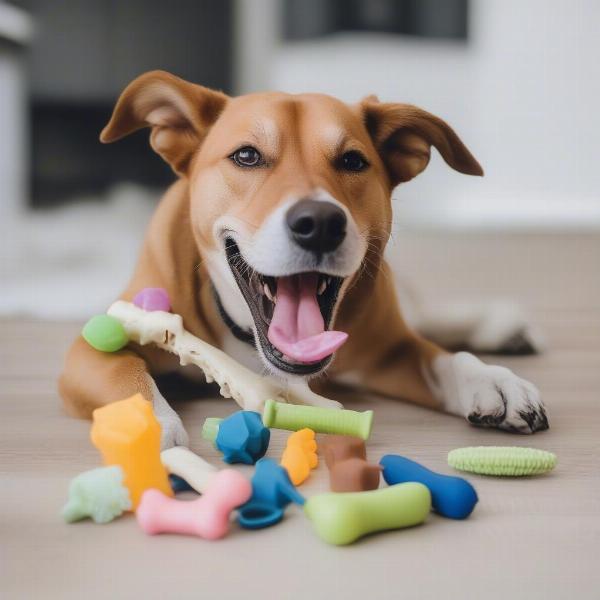Beef brisket bones are often seen as a tasty and affordable treat for dogs. However, before you toss your dog a leftover brisket bone, it’s crucial to understand the potential risks and benefits associated with this popular chew. Are brisket bones safe for dogs, and if so, what precautions should you take? This article will delve into the details to help you make an informed decision about feeding beef brisket bones to your canine companion.
Understanding the Risks of Beef Brisket Bones for Dogs
While the aroma of cooked brisket might be tempting for both you and your dog, cooked bones pose significant dangers. The cooking process makes bones brittle and prone to splintering. These sharp fragments can cause various problems, including:
- Mouth and throat injuries: Splinters can get lodged in your dog’s mouth, gums, or throat, leading to pain, bleeding, and infection.
- Digestive tract damage: Swallowed bone fragments can irritate or puncture the esophagus, stomach, or intestines, potentially requiring emergency surgery.
- Constipation: Bone fragments can contribute to constipation, making it difficult and painful for your dog to pass stool.
- Blockages: In severe cases, large bone fragments can cause a blockage in the digestive tract, a life-threatening condition.
Are Raw Brisket Bones Safe for Dogs?
Raw brisket bones, while generally safer than cooked ones, are not without risks. They are less likely to splinter but can still pose a choking hazard, especially for smaller dogs. Additionally, raw bones can carry bacteria like Salmonella and E. coli, which can make your dog sick.
Safe Alternatives to Brisket Bones
If your dog loves to chew, plenty of safer alternatives exist. Consider these options:
- Dental chews: Designed to promote dental health, these chews come in various shapes, sizes, and flavors.
- Rubber toys: Durable rubber toys provide a satisfying chew and can be filled with treats to keep your dog entertained.
- Nylon bones: Nylon bones are designed to be long-lasting and help clean your dog’s teeth.
- Bully sticks: Made from dried beef pizzle, bully sticks are a natural and digestible chew option.
 Dog Chewing Safe Alternatives
Dog Chewing Safe Alternatives
What to Do If Your Dog Swallows a Brisket Bone
If your dog swallows a brisket bone, contact your veterinarian immediately. Signs of a problem can include vomiting, diarrhea, abdominal pain, lethargy, and difficulty defecating. Do not induce vomiting unless instructed by your veterinarian.
Can Dogs Have Brisket Bone Broth?
Brisket bone broth, made by simmering raw brisket bones, can be a healthy addition to your dog’s diet. It’s a source of collagen, glucosamine, and chondroitin, which can benefit joint health. However, ensure all bone fragments are removed before giving the broth to your dog.
Conclusion
While the temptation to give your dog a beef brisket bone might be strong, the potential risks often outweigh the benefits. Opting for safer alternatives can ensure your furry friend enjoys a satisfying chew without compromising their health. Always consult your veterinarian if you have any concerns about your dog’s diet or chewing habits.
FAQ
- Can puppies have brisket bones? No, puppies are especially vulnerable to bone-related injuries due to their developing teeth and digestive systems.
- What type of bones are safe for dogs? Raw, meaty bones from large animals, such as beef or bison, are generally safer than cooked bones, but always supervise your dog when they are chewing any type of bone.
- Are smoked brisket bones safe for dogs? No, smoked brisket bones are just as dangerous as other cooked bones and should be avoided.
- Can dogs digest bone marrow? Yes, dogs can digest bone marrow, and it can be a good source of nutrients.
- How can I prevent my dog from swallowing bone fragments? Supervise your dog closely when they are chewing on a bone, and remove the bone when it becomes small enough to swallow.
- What are the signs of a bone obstruction in a dog? Signs of a bone obstruction can include vomiting, diarrhea, loss of appetite, lethargy, and abdominal pain.
- What should I do if my dog is choking on a bone? If your dog is choking on a bone, try to remove it if possible. If you cannot remove the bone, seek immediate veterinary attention.
ILM Dog is a leading international dog website dedicated to providing expert advice on dog care and breeding. We offer a wealth of information on various topics, including dog breeds, health, training, nutrition, grooming, and much more. Whether you’re a new dog owner or a seasoned expert, ILM Dog has the resources you need to provide the best possible care for your canine companion. For personalized advice and support, contact our expert team at [email protected] or call us at +44 20-3965-8624. Visit us at ILM Dog for more valuable insights and expert guidance on dog care.